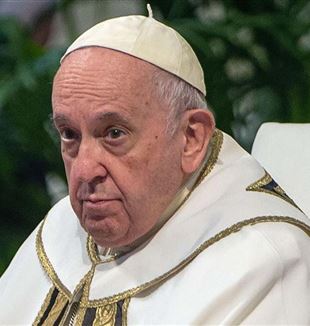
"Do you love me?" The heart of the council
"Let us rediscover what is essential: a Church madly in love with its Lord and with all the men and women whom He loves." Pope Francis' homily for the 60th anniversary of the beginning of the Second Vatican Council.“Do you love me?” These are the first words that Jesus speaks to Peter in the Gospel that we have just heard (Jn 21:15). His final words are: “Feed my sheep” (v. 17). On the anniversary of the opening of the Second Vatican Council, we can sense that those same words of the Lord are also addressed to us, to us as Church: Do you love me? Feed my sheep.
First: Do you love me? It is a question, for Jesus’ style is not so much to offer answers as to ask questions, questions that challenge our lives. The Lord, who “from the fullness of his love, addresses men and women as his friends and lives among them” (Dei Verbum, 2), continues to ask the Church, his Bride: “Do you love me?” The Second Vatican Council was one great response to this question. To rekindle her love for the Lord, the Church, for the first time in her history, devoted a Council to examining herself and reflecting on her nature and mission. She saw herself once more as a mystery of grace generated by love; she saw herself anew as the People of God, the Body of Christ, the living temple of the Holy Spirit!
This is the first way to look at the Church: from above. Indeed, the Church needs first to be viewed from on high, with God’s eyes, eyes full of love. Let us ask ourselves if we, in the Church, start with God and his loving gaze upon us. We are always tempted to start from ourselves rather than from God, to put our own agendas before the Gospel, to let ourselves be caught up in the winds of worldliness in order to chase after the fashions of the moment or to turn our back on the time that Providence has granted us, in order to retrace our steps. Yet let us be careful: both the “progressivism” that lines up behind the world and the “traditionalism” – or “looking backwards” – that longs for a bygone world are not evidence of love, but of infidelity. They are forms of a Pelagian selfishness that puts our own tastes and plans above the love that pleases God, the simple, humble and faithful love that Jesus asked of Peter.
Do you love me? Let us rediscover the Council in order to restore primacy to God, to what is essential: to a Church madly in love with its Lord and with all the men and women whom he loves; to a Church that is rich in Jesus and poor in assets; to a Church that is free and freeing. This was the path that the Council pointed out to the Church. It led her to return, like Peter in the Gospel, to Galilee, to the sources of her first love; to rediscover God’s holiness in her own poverty (cf. Lumen Gentium, 8c; chapter 5. Each one of us also has his or her own Galilee, the Galilee of our first love, and certainly today we are all called to return to our own Galilee in order to hear the voice of the Lord: “Follow me”. And there, to find once more in the gaze of the crucified and risen Lord a joy that had faded; to focus upon Jesus. To rediscover our joy, for a Church that has lost its joy has lost its love. Towards the end of his life, Pope John wrote: “This life of mine, now nearing its sunset, could find no better end than in the concentration of all my thoughts in Jesus, the Son of Mary… a great and constant friendship with Jesus, contemplated as a Child and upon the Cross, and adored in the Blessed Sacrament” (Journal of a Soul). This is our view from on high; this is our ever-living source: Jesus, the Galilee of love, Jesus who calls us, Jesus who asks us: “Do you love me?” [...]
Continue reading on vatican.va